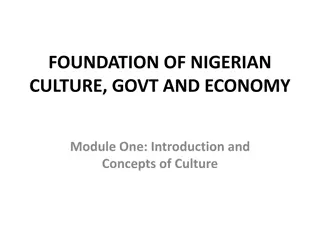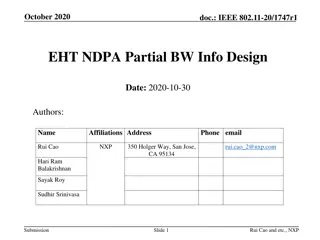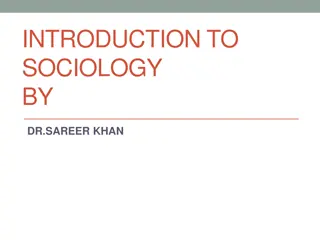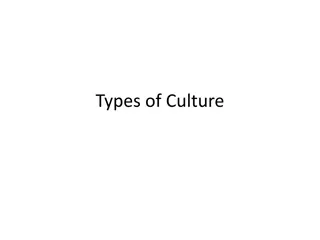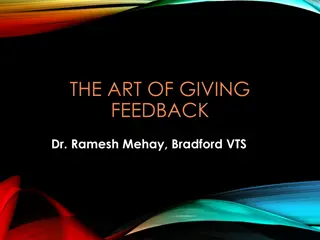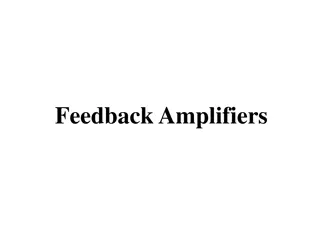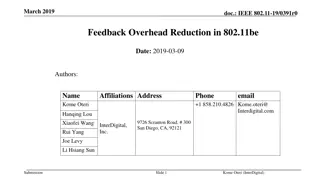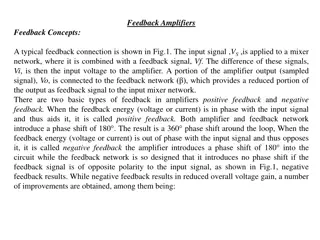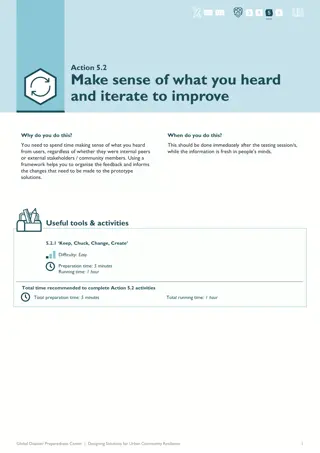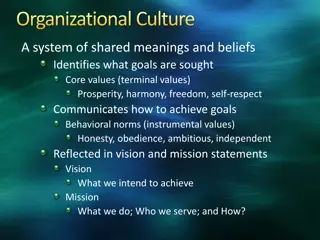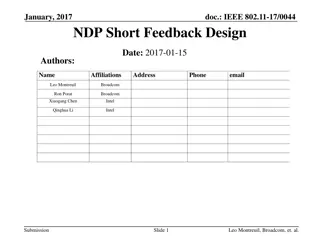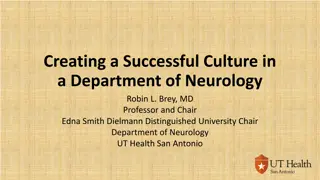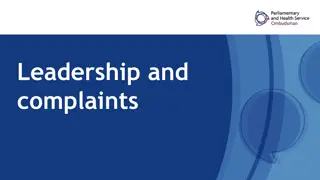Enhancing Student Learning Through Effective Feedback Strategies
Effective feedback plays a crucial role in improving student learning outcomes by providing specific information that students can use to enhance their performance. This content explores the importance of feedback, examples of good feedback practices, qualities of good feedback, and what components
5 views • 16 slides
Understanding Nigerian Culture, Government, and Economy: Module One
Delve into Module One of the course on Nigerian culture, government, and economy with a focus on the Introduction and Concepts of Culture. Explore definitions of culture, various types of culture, characteristics, importance, related concepts, levels, and differences between culture and ethnic group
1 views • 31 slides
Effective Strategies for Providing Timely Feedback in Academic Settings
Explore key features of feedback, including goal-oriented focus, specificity, user-friendliness, timeliness, and consistency. Learn about factors influencing the acceptance and delivery of feedback, along with stages of change in implementing timely feedback practices for students in educational env
1 views • 33 slides
Understanding Plant Tissue Culture: Methods and Requirements
Plant tissue culture involves the in-vitro culture of plant explants under aseptic conditions, covering cell, organ, and suspension cultures. This process, pioneered by German botanist Gottlieb Haberlandt, relies on the totipotency of plant cells. Key requirements include laboratory organization, su
0 views • 18 slides
Design Considerations for Partial Bandwidth Information in IEEE 802.11-20/1747r1
Design considerations for partial bandwidth information in the IEEE 802.11-20/1747r1 standard are discussed, focusing on EHT NDPA frame structure, feedback mechanisms, bitmap design, and table-based designs to support large RU/MRUs. The feedback mechanism utilizes bitmap resolution signals, providin
1 views • 10 slides
Understanding Culture in Sociology: Key Concepts and Definitions
Culture is the cornerstone of society, distinguishing humans from animals and shaping our social lives. Sociologists define culture as the shared values, practices, norms, and beliefs that govern our interactions and behaviors. This comprehensive guide explores the non-material aspects of culture, i
1 views • 30 slides
Overview of Cell Culture Methods and Importance in Research
Introduction to the principles of cell culture, including tissue culture, organ culture, and cell culture methods. Discusses the advantages and disadvantages of each technique and highlights the need for cell culture in research for studying cellular behavior and large-scale production of cell mater
1 views • 45 slides
Understanding Popular Culture: Classification and Impact
General classification of culture includes Popular, High/Elite, Low/Subculture, Primary & Secondary, Folk, and Co-Culture. Popular culture, shaped by mass media, encompasses ideas, attitudes, and phenomena favored by society. It influences daily life, with examples like styles of dress, slang, and s
0 views • 16 slides
Effective Feedback Strategies for Learning Enhancement
Feedback plays a crucial role in the learning process. This session focuses on strategies for providing effective feedback to improve learning outcomes, course, and assignment design, best practices, and tools for efficient feedback delivery. Understanding the importance of prompt feedback and diffe
3 views • 20 slides
Mastering Feedback Report Writing: Rules and Guidelines for Effective Communication
Dive into the essentials of feedback report writing with a focus on Strengths and Opportunities for Improvement (OFI) comments. Learn the purpose, conventions, and best practices for crafting impactful feedback that helps organizations strive towards higher performance and efficiency. Understand the
1 views • 18 slides
Mastering the Art of Giving Feedback
Learn the importance of feedback, how to provide it effectively, and why it is crucial for personal and professional development. Explore the positive impact feedback can have on performance, motivation, self-awareness, and insights. Discover practical tips on giving constructive criticism and creat
1 views • 39 slides
Understanding Feedback Amplifiers: Structure, Properties, and Topologies
Electronic circuits rely heavily on feedback mechanisms, particularly negative feedback, for various purposes such as desensitizing gain, reducing distortion, controlling impedance, and improving amplifier bandwidth. This article explores the general structure of feedback, properties of negative fee
0 views • 68 slides
Reduction of Feedback Overhead in IEEE 802.11be
Discussion on reducing channel acquisition overhead to support 16 Spatial Stream MIMO and Multi-AP coordination in IEEE 802.11be. Methods include limiting feedback information, using implicit feedback in reciprocal systems, and improving explicit and implicit feedback schemes.
0 views • 14 slides
Enhancing Feedback Practices with Audio-Visual Technology: A Study on Student Satisfaction and Attainment
This presentation delves into the implementation of Audio-Visual Feedback (AVF) technology to improve assessment feedback practices in an educational institution. The study explores the impact of AVF on student satisfaction levels compared to traditional written feedback, as well as its influence on
0 views • 21 slides
Understanding the Importance of Feedback in Achievement Enhancement
Feedback plays a crucial role in encouraging or discouraging behavior, making it essential to provide constructive feedback that focuses on growth and improvement. Improper feedback can lead to incompetence in the workplace. Learn about the definition of feedback, how to give feedback effectively, a
2 views • 22 slides
Understanding Feedback Amplifiers in Electronic Circuits
Feedback amplifiers play a crucial role in electronic circuits by providing mechanisms for controlling gain, stability, and overall performance. There are two basic types of feedback - positive and negative, each offering distinct advantages. The four ways of connecting feedback signals involve volt
0 views • 18 slides
Enhancing Student Writing: Effective Feedback Strategies
Enhance student writing through effective feedback strategies sponsored by the Writing Across the Curriculum Program at San Jose State University. The feedback process is viewed as an opportunity to teach, emphasizing strengths, weaknesses, and improvement areas for students. Designing clear instruc
0 views • 60 slides
NPEP Research Project on Effective Feedback Strategies
The NPEP project at Cwmfelin Primary School, led by Kyle Winter, focuses on exploring alternative strategies to traditional written feedback in promoting meaningful pupil engagement and progress. Due to the pandemic limitations, the research adopts a qualitative approach using interviews with pupils
0 views • 19 slides
Mera Aspataal: Improving Patient-Centric Care in India
Mera Aspataal is an initiative by the Ministry of Health and Family Welfare, Government of India, aimed at capturing patient feedback to enhance the quality of healthcare services. Through a user-friendly ICT-based system, patients can provide feedback quickly, enabling healthcare providers to deliv
1 views • 29 slides
Enhancing Feedback Strategies in ELA Learning Project Day
Refine understanding of ELA, engage with student exemplars, and design constructive feedback in a structured agenda. Activities include generating feedback, digging deeper into feedback processes, and considering the impact of timely and specific feedback on student growth in learning and skills. Co
0 views • 31 slides
Effective Feedback Strategies for Resident Teachers
Effective feedback is critical for the growth of resident teachers. This guide covers types of feedback, why it's important, what makes feedback effective, behaviorally anchored rating scales, models for giving feedback, and key tips for delivering feedback successfully.
0 views • 14 slides
Effective Feedback Strategies for High Performance
Feedback plays a crucial role in helping individuals improve performance and reach their full potential. From providing helpful feedback to reinforcing desired behaviors, this guide explores various strategies, including redirection, reinforcement, and F.A.S.T. feedback, to enhance workplace perform
0 views • 21 slides
Proposed NRC Safety Culture Policy Statement Overview
This document provides an overview of the proposed Nuclear Regulatory Commission (NRC) Safety Culture Policy Statement presented by Eric Fries, the Safety Culture Program Manager. It covers topics such as NRC's mission, responsibility, safety culture background, draft policy statement, current statu
0 views • 24 slides
Enhancing Postgraduate Academic Writing: Feedback Collaboration Model
Developing a collaborative model for postgraduate academic writing courses involves understanding the role of feedback, focusing on content feedback, and exploring the intersections between discipline specialist and writing tutor feedback to improve academic writing abilities. Feedback offers valuab
1 views • 27 slides
Plant Tissue Culture Methods for Growth and Reproduction Study
Plant tissue culture methods such as root tip culture, shoot-tip culture, leaf culture, flower culture, and anther and pollen culture allow for the study of growth, reproduction, and genetic variations in plants. These techniques involve culturing various plant parts under sterile conditions to inve
1 views • 20 slides
Iterative Feedback Framework for Prototype Improvement
The iterative feedback framework involves making sense of user feedback using the Keep, Chuck, Change, Create (KCCC) model to iterate and enhance prototype solutions. This process helps organize input from testing sessions, informing necessary modifications for better outcomes. The framework emphasi
1 views • 26 slides
Enhancing Student Learning Through Compassionate Feedback in Geography Education
Feedback in geography education has traditionally been viewed as a technical exercise, but there is a growing emphasis on incorporating emotions and fostering a supportive learning culture. Compassionate feedback, personalized and friendly, is essential for motivating students and encouraging improv
0 views • 31 slides
Understanding Organizational Culture and Its Impact on Business Success
Organizational culture encompasses shared beliefs, values, and behaviors within a company. It influences goal-setting, strategies, and employee actions. The transmission of culture is vital for aligning values with business practices. Culture matters for client relations, differentiation, and managi
0 views • 17 slides
Understanding Mid-Course Feedback Using Qualtrics
Mid-Course Feedback (MCF) is a valuable process that allows students to provide feedback on their courses mid-semester, impacting teaching strategies, communication, materials, and more. This feedback benefits both students and instructors by improving teaching effectiveness, student satisfaction, a
0 views • 21 slides
Importance of Student and Staff Feedback in Educator Evaluation
Student and staff feedback plays a crucial role in educator evaluation, providing valuable insights into areas of strength and growth. Informed by evidence such as surveys, observations, and artifacts, feedback helps educators tailor their practice, fostering two-way communication and professional d
0 views • 14 slides
Understanding Cascade Control Systems in Industrial Processes
Cascade control systems play a crucial role in improving process control efficiency by incorporating feedback loops within feedback loops. This type of control architecture helps to better handle disturbances and variations in the process by creating secondary loops that monitor specific parameters.
0 views • 8 slides
IEEE 802.11-17/0044 NDP Short Feedback Design
The document discusses the need for short simultaneous feedback from multiple STAs in IEEE 802.11 systems for improved efficiency. It introduces the NDP feedback mechanism and proposes a signaling technique to efficiently collect feedback from a high number of STAs. The mechanism involves UL MU tran
0 views • 19 slides
AI Automation for Corrective Feedback in Language Learning
Exploring the utilization of AI technology to automate and enhance corrective feedback in language learning, addressing challenges such as time constraints, delayed feedback, and student comprehension. Introduction of a new AI text tool by Marcus Green for accessible and effective feedback provision
0 views • 13 slides
Enhancing Research Appointment Services at UMBC Library
UMBC subject librarians implemented a feedback survey to improve research appointment services. By analyzing feedback data, shared best practices were developed to ensure quality and consistency. The project timeline included identifying goals, drafting the timeline, creating the feedback form, and
0 views • 7 slides
Understanding the Importance of Feedback in Learning and Development
Feedback plays a crucial role in providing information about performance or behavior to affirm strengths and improve weaknesses. It helps individuals become consciously competent by identifying areas for improvement through formative assessment. Effective feedback enhances motivation, promotes learn
0 views • 33 slides
IEEE 802.11-19/0709r0 - Immediate and Delayed Feedback May 2019
The document discusses immediate and delayed feedback mechanisms in IEEE 802.11-19/0709r0, focusing on parameters, feedback types, and ranging options. It explores variations in feedback direction and types, proposing options for phase shift feedback and distinguishing between RSTA-to-ISTA and ISTA-
0 views • 6 slides
Challenges of Globalization in Popular Culture
Globalization of popular culture presents challenges such as the threat to folk culture and negative environmental impacts. Rising incomes lead to a shift from folk to popular culture, affecting traditional values and clothing symbolism. The adoption of Western clothing in Middle Eastern countries f
0 views • 12 slides
Cultivating a Successful Culture in Neurology Department
Importance of culture in a neurology department highlighted by Dr. Robin L. Brey. Emphasis on how culture trumps strategy and the role of leaders in maintaining a positive culture. Examples and insights on how culture influences decision-making and behavior. Attributes of a successful culture and ho
0 views • 21 slides
Product Feedback Forum at NWS: Provisional PS-PVR User Feedback on ABI, CMI, and L1b
A comprehensive feedback system managed by PRO at NWS, focusing on user input for GOES-R products such as ABI, CMI, and L1b. The forum gathers feedback through surveys and weekly calls, addressing product quality issues and ensuring effective communication with field sites. Noteworthy discussions in
0 views • 18 slides
Effective Leadership Strategies for Handling Complaints and Feedback
Understanding the value of complaints, actively seeking feedback, empowering staff, and handling complaints as a team are key leadership practices to prevent issues from escalating. Promote a culture where feedback is welcomed, learn from patient stories, monitor feedback trends, and take appropriat
0 views • 7 slides

